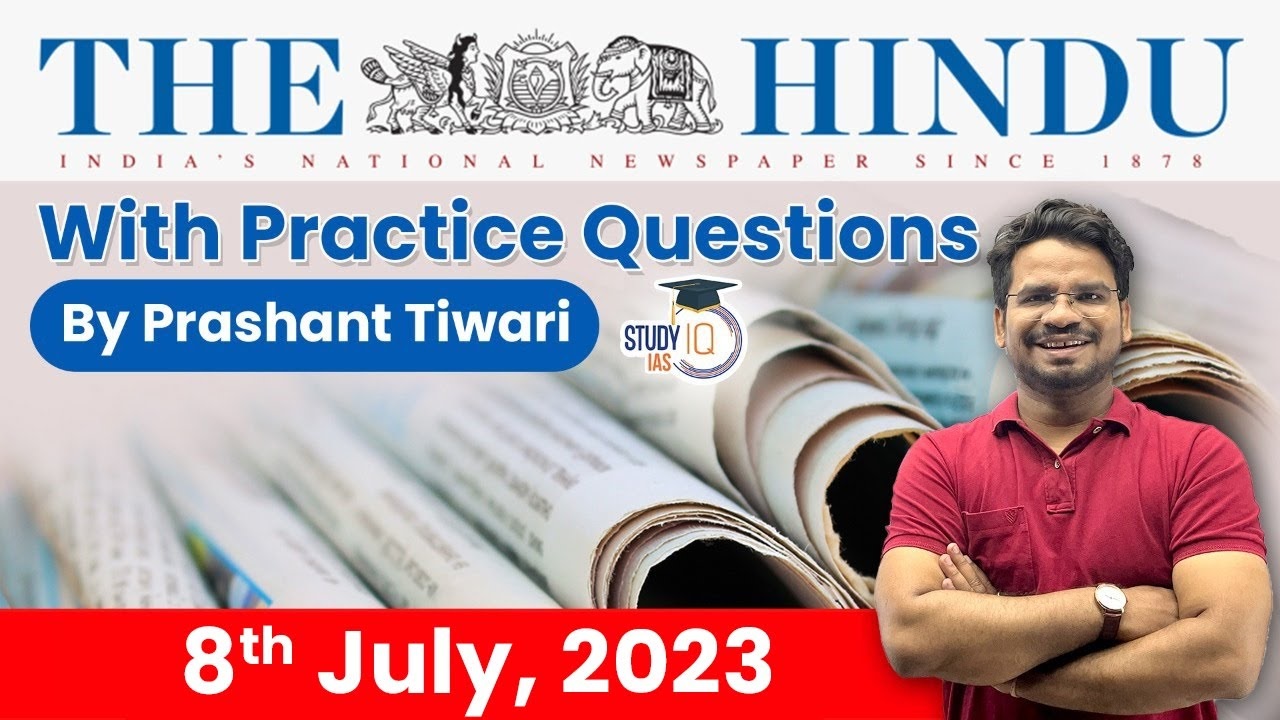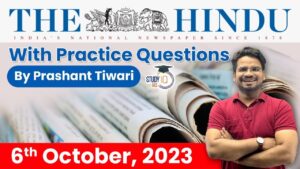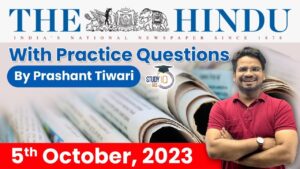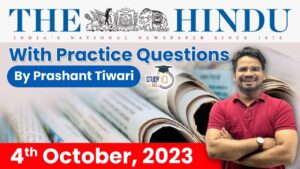The Hindu Newspaper Analysis for UPSC
- Disqualification of a lawmaker
- It is prescribed in three situations.
- First is through Articles 102(1) and 191(1) for disqualification of a member of Parliament and a member of the Legislative Assembly respectively.
- The grounds here include the following
- If he holds any office of profit under the Union or state government (except that of a minister or any other office exempted by Parliament).
The Hindu Editorial Today
- If he is of unsound mind and stands so declared by a court.
- If he is an undischarged insolvent.
- If he is not a citizen of India or has voluntarily acquired the citizenship of a foreign state or is under any acknowledgement of allegiance to a foreign state
- The second prescription of disqualification is in the Tenth Schedule of the Constitution, which provides for the disqualification of the members on grounds of defection.
- A member incurs disqualification under the defection law:
- If he voluntarily gives up the membership of the political party on whose ticket he is elected to the House;
- If he votes or abstains from voting in the House contrary to any direction given by his political party;
- If any independently elected member joins any political party; and
- If any nominated member joins any political party after the expiry of six months.
- The third prescription is under The Representation of The People Act (RPA), 1951. This law provides for disqualification for conviction in criminal cases.
- Section 8(3) states “A person convicted of any offence and sentenced to imprisonment for not less than two years shall be disqualified from the date of such conviction and shall continue to be disqualified for a further period of six years since his release.”
- Section 8(4):
- It states that the disqualification takes effect only “after three months have elapsed” from the date of conviction. Within that period, MP can file an appeal against the sentence before the High Court.
- Lily Thomas v Union of India:
- While the law had initially provided for a pause on disqualification if an appeal against the conviction was filed before a higher court, in the landmark 2013 ruling in ‘Lily Thomas v Union of India’, the Supreme Court struck down Section 8(4) of the RPA as unconstitutional.
- This means that simply filing an appeal will not be enough but the convicted MP must secure a specific order of stay against the conviction of the trial court.
- What is Defamation?
- About:
- It is an injury to the reputation of a person resulting from a statement that is false.
- IPC Section 499 lays down the definition of defamation and Section 500 lays down the punishment for criminal defamation (two years’ imprisonment for a person found guilty of defamation).
- There are two types of defamation in India: Civil and Criminal.
- Civil defamation: Under this, a person who is defamed can move either High Court or subordinate courts and seek damages in the form of monetary compensation. There is no punishment in the form of a jail sentence.
- Criminal Defamation: Under this, the person against whom a defamation case is filed might be sentenced to two years’ imprisonment or fined or both.
- While India cannot be the kind of ally that American wants, New Delhi must use the outcome of the Prime Minister’s successful state visit to skilfully function as a ‘bridge power’
- Two U.S. Presidents in particular, Lyndon B. Johnson in 1963 and Richard Nixon in 1971, are still remembered for their infamous roles in this respect. Johnson for denying aid to India in the wake of China’s perfidious attack on India in 1962, and Nixon during the India-Pakistan conflict in 1971 for sending the U.S. Seventh Fleet steaming up the Bay of Bengal in a show of force intended to deter India from supporting the ‘liberation struggle’ in East Bengal, which ultimately led to the birth of a new nation, Bangladesh.
- The promise of the transfer of technology in several areas, most conspicuously in terms of producing fighter jet engines for the Indian Air Force, and holding out the promise of the initiative on Critical and Emerging Technology (iCET) marks a remarkable turn in the American attitude.
- The Prime Minister’s push for a uniform civil codes has led to alarm among tribal communities in different regions of the country.
- It is empowered by the Panchayats (Extension to Scheduled Areas) Act or PESA Act, 1996, to use the “customary mode of dispute resolution” for disputes related to land, family, and marriage, among others.
- Special legislation such as the PESA Act, 1996; the Chota Nagpur Tenancy Act, 1908; and the Santhal Parganas Tenancy Act, 1876, recognise such customary practices in Jharkhand, which are protected under the Fifth Schedule of the Constitution.
- There also judicial precedents which recognise customary practices and authorise lower courts to make decisions on their basis.
- The Telecom Regulatory Authority of India (TRAI) on Friday put out a consultation paper asking if it would be possible for messaging apps such as WhatsApp to be brought under a licensing framework, and whether such apps can be banned “selectively” in places where an Internet shutdown would otherwise have been imposed.
- TRAI had recommended in September 2020 that there was no need to regulate “OTT communication services,” the term for such apps that allow calling and texting over the Internet, often with encryption that makes it difficult for anyone to access the content of a conversation.
- Telecom operators have previously called for messaging apps to be regulated, and demanded that they pay for some of the costs networks incur in running their infrastructure.
- WhatsApp complies globally with requests to share so-called “metadata”, such as a given user’s phonebook or the details of whom they called or messaged in a certain period. They cannot, however, share the contents of messages exchanged between users, or recordings of phone calls, as these are end-to-end encrypted.
- S. President Joe Biden’s administration has decided to provide cluster munitions to Ukraine and is expected to announce late on Friday that the Pentagon will send thousands of them as part of a new military aid package worth up to $800 million for the war effort against Russia, according to people familiar with the decision.
- The decision comes despite widespread concerns that the bombs can cause civilian casualties and sparked a call from the UN to both Russia and Ukraine to avoid using them. The Pentagon will provide munitions that have a reduced “dud rate”, meaning there will be far fewer unexploded rounds that can result in unintended civilian deaths.
- The weapons will come from Pentagon stocks and will also include Bradley and Stryker armoured vehicles and an array of ammunition, such as rounds for howitzers and the High Mobility Artillery Rocket System, officials said.
- Long sought by Ukraine, cluster bombs are weapons that open in the air, releasing submunitions, or bomblets, that are dispersed over a large area and are intended to wreak destruction on multiple targets at once.
Sharing is caring!


 The Hindu Newspaper Analysis 6 October 2...
The Hindu Newspaper Analysis 6 October 2...
 The Hindu Newspaper Analysis 5 October 2...
The Hindu Newspaper Analysis 5 October 2...
 The Hindu Newspaper Analysis 4 October 2...
The Hindu Newspaper Analysis 4 October 2...





















